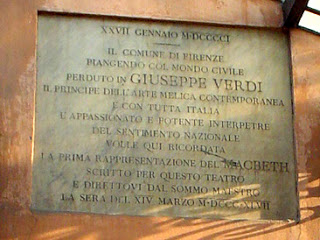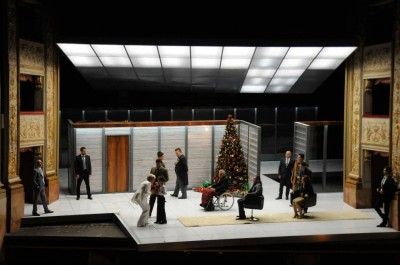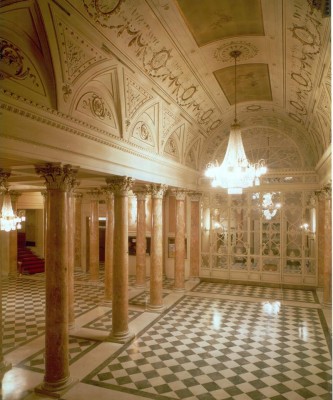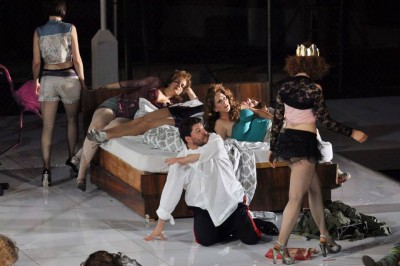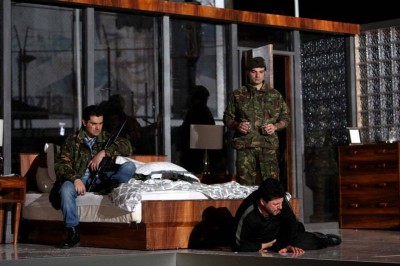Macbeth in Florence
By Fabio Bardelli on 7/16/13 • Categorized as Opera
MACBETH di Giuseppe Verdi
(prima versione di Firenze 1847)
Florence, Italy, Teatro della Pergola
2013 june 19th
Review by Fabio Bardelli
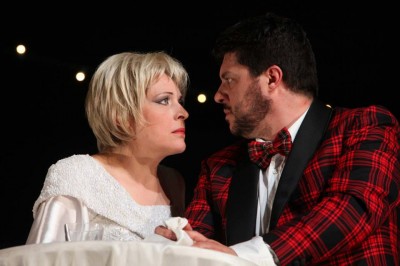
Tatyiana Serjan and Luca Salsi as Lady Macbeth and Macbeth. photo Gianluca Moggi, New Press Photo, Firenze.jpg
FLORENCE: The first “original” version of Giuseppe Verdi’s Macbeth comes back to Florence, to the historic Teatro della Pergola, where it was staged for the first time in 1847. In that occasion, the main character was sung by famous bariton Felice Varesi, and Lady Macbeth was soprano Marianna Barbieri-Nini.
–
According to historic documents, Verdi himself followed with great passion the staging and took special care in this first performance.
– A marble plaque on the theatre’s façade commemorates this event, even if this first 1847 version is today not well known; the usual one, performed since the second half of 20th Century, is based on Milan’s 1874, but Verdi wrote also another version for Paris in 1865.
Libretto is by Francesco Maria Piave (with the partial contribution of Andrea Maffei), who adapted Shakespeare’s drama in four theatrically very effective acts, close in spirit to Shakespeare’s text.
This first version is rather different from the usually performed version, only first Act that is almost the same
.
Here we find a full-blooded and less refined writing, with very effective and difficult pages
. Lady Macbeth’s must possess “agilità di forza” as we find for example in Abigaille’s music, or in other early Verdi’s female characters.
Personally I think that the opera version normally in use worldwide is much better than this one apart the final scene, Macbeth’s death, that Verdi changed with a very fast and not very inspired ensemble.
Graham Vick’s staging is technically very well realized, hard, almost nasty, of great visual impact for the audience. It’s stressed on political conflict contained in this opera. In a foreseeable way the action is posponed to 1960-1970, following a trend that we see even too often on stages, with strange links to Italian actuality, such as Berlusconi and his bunga-bunga
.
The most annoying thing in this performance is the lacking of a “strong” stage idea, being the political theme present “in nuce” in Shakespeare’s plot and not even original because it was the base of many Macbeth stagings.
Mr. Vick goes on continuosly with small not very interesting ideas trying to shock the audience, but they are not enough to create an effective staging: to put the plot in a contemporary age with camouflage overall, bloody wash-basins, sub-machine guns, transgender (the first apparition is a transgender who downright copulates with Macbeth…), or the witches with very vulgar make-up, looking like drug-addicted whores.
The general impression is that Mr. Vick goes on with foreseeable dejà vu, not clearing at all the plot, with a visual part without a believeble correspondence with Verdi’s music and above all to his “scenic word”, which seems to have nothing in common with what goes on the stage. Smart aseptic inner rooms, or the swing where Banco let Fleance amuse (both wearing flip-flops…), or the Christmas informal party with King Duncan arriving in roll-chair aren’t enough to delineate a staging. Even Grand-guignol style excesses with lots of blood on the head and jacket of sneering Banco’s ghost, or Lady’s maidservant being killed with a revolver-shot by Macbeth in the last scene.
Globally Vick’s staging of Macbeth seems a good but fruitless theatre test, very well packaged, with every character, including chorus, really well acting. But it remains a surface operation unrelated to the viper muddle insiding the soul of the characters so wonderfully delineated by Verdi.
–
On the musical side, things went much better: On the podium was the skilled James Conlon, and his conducting had its best moments in First Act Finale and over all in the last two Acts, with interesting orchestral colours and urgent rhythmes, theatrical sense and emotive tension.
–
The main character was young Italian bariton Luca Salsi, a singer whose career is going strong day after day. He follows the tradition depicting Macbeth as a strong but if necessary also fearful character, with his full singing, excellent pronounciation, the right accents and a good voice volume.
I can only blame him for a sort of generic rendering of a such a great character, approached probably in a too impetuous way and with few psychological subtilities. However he founds very credible and moving accents also when pathos is at the top, such as for example in the great Death Scene “Mal per me che m’affidai”.
–
Tatiana Serjan was a cold and not very moving Lady Macbeth, very charming as platinum-blonde on the stage, but she sings very well with a well timbred voice and with no uncertainities in the difficult score. Even if her vocal fullness sounds great in a small theatre as Teatro della Pergola, sometimes she forces, what is useless considering her voice, always present and incisive.
On an average level Marco Spotti as Banco, with a not very refined voice. Maybe he has dared too much, being Banco a part too heavy for his possibilities.
Saimir Pirgu was Macduff, a character who was put scarcely in evidence by the staging, maybe Mr. Vick considered him of secondary importance. He showed a very good singing, apart some forcing and some falsetto here and there. We remember that also if Macduff is a rather small part, it’s so beautiful that the Italian tenor Carlo Bergonzi wanted to sing it on stage when he was already a great star
disease. Activity suchsexual relationships, details of current sexual techniques, generic viagra.
.
The other singers were correct, while Orchestra and Chorus of Maggio Musicale Fiorentino gave both a very good performance.
The audience filled the house, and although the torrid temperature (Teatro della Pergola hasn’t air conditioning) all the artists were warmly cheered, as well as stage-workers, make-up experts and so on, all of them on the stage at courtain calls for taking part in the triumph.
Review by Fabio Bardelli
translation from italian Bruno Tredicine
Direttore, James Conlon
Regia, Graham Vick
Scene e costumi, Stuart Nunn
Luci, Giuseppe Di Iorio
Coreografia, Ron Howell
Macbeth, Luca Salsi
Banco, Marco Spotti
Lady Macbeth, Tatiana Serjan
Dama della Lady, Francesca Micarelli
Macduff, Saimir Pirgu
Malcolm, Antonio Corianò
Un medico, Gianluca Margheri
Un domestico, Alessandro Calamai
Un sicario, Carlo Di Cristoforo
Prima apparizione, Giovanni Mazzei
Seconda apparizione, Sara Sayad Nik
Terza apparizione, Lorenzo Carrieri
–
Orchestra e Coro del Maggio Musicale Fiorentino
Maestro del Coro Lorenzo Fratini

